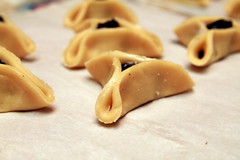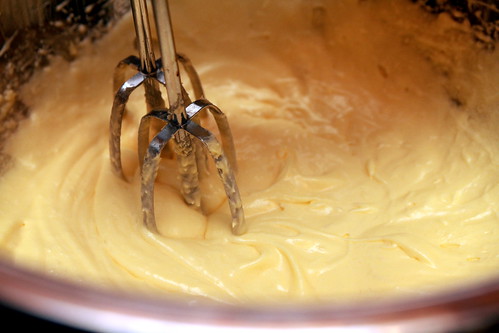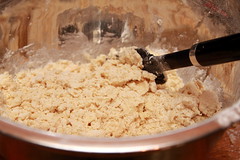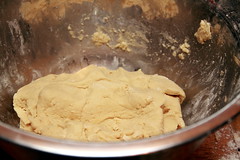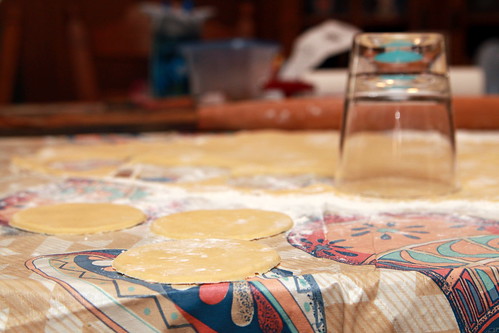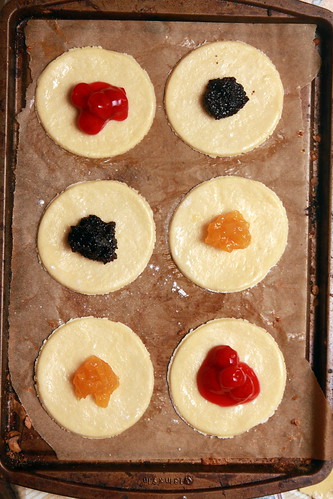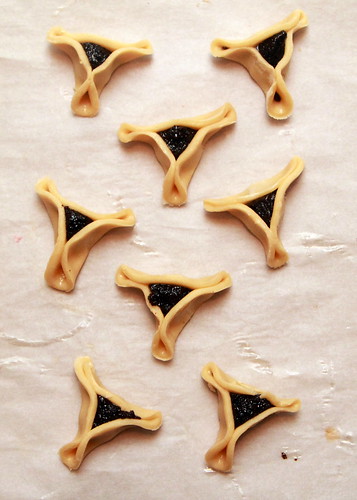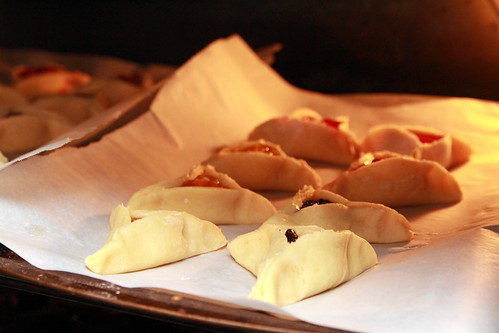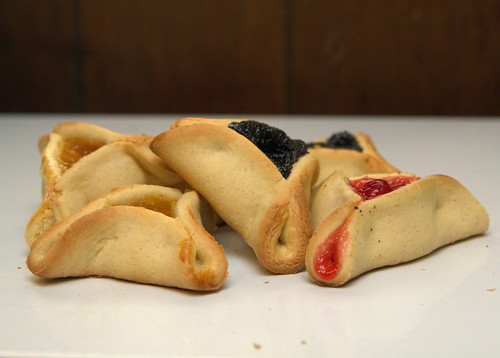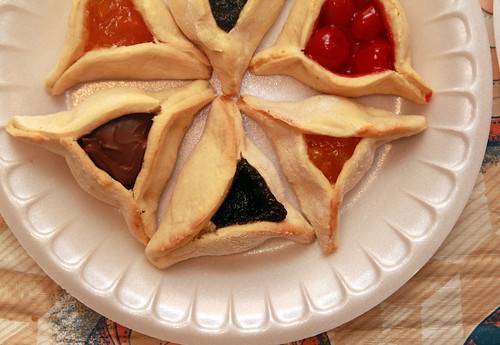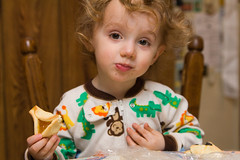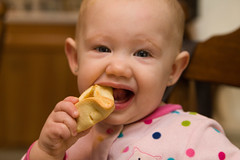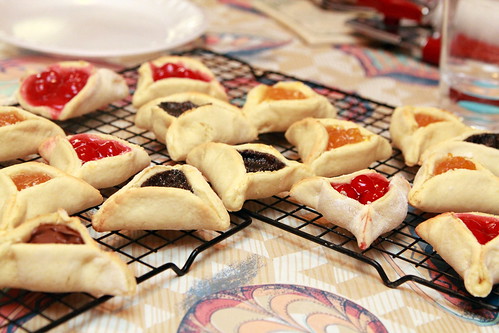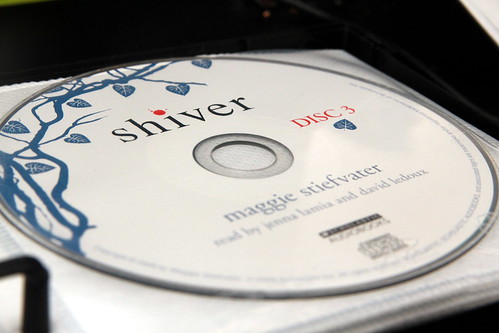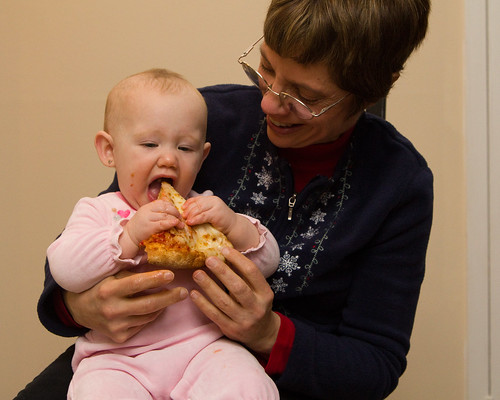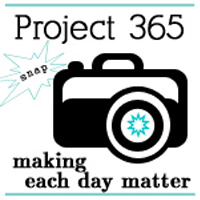For those of you who aren't familiar with the rules of eating Kosher for Passover - The Torah commands Jews to refrain from eating, owning, or benefiting from chametz (anything leavened) for the week-long festival of Passover. "Chametz" was determined by our rabbis and sages over the years to include not only things that are leavened, but things that may become leavened, and, for some Jews, things that look like things that may become leavened. So, anything containing or anything having come in contact with: wheat, spelt, rye, oats, barley, rice, beans, corn. Finding food products without those ingredients is pretty much impossible. Even ketchup and Coke have corn syrup in them. A lot of Jews even have separate dishes, pots and pans, and utensils.
Think about the cost of food bought special-for-Passover, not to mention duplicating everything in your kitchen (times two, one set for meat and one for dairy), and your head is probably spinning. Even those of us who have been doing it for years and years find the whole undertaking stressful to say the least. And while I don't want to speak for my fellow Jewish home managers, the COST of all this is by far the most stressful element.
Just as the requisite complete and total panic was tugging at the edges of my brain, threatening to make me completely insane, driving me to fill my parents' basement with 30 pounds of matzah, two new sets of pots and pans, and a dozen jars of gefilte fish at whatever price I could find them, because OMIGOD PASSOVER IS COMING AND MY FAMILY MIGHT STARVE, my dear friend Mara over at Kosher on a Budget hosted the incredible Susie Sharf of Cheapskate for a series of guest posts on "How to Shop for Passover on a Budget" . Susie had a lot of awesome tips on that post about responsible shopping for Passover, arguably the only tips one could ever need.
The one that really stuck with me and that has been knocking around my brain and turning over and over in my heart, however, is #2. This rule of thumb for Pesach prep is so priceless, and it's only eight words long. Are you ready?
It's only eight days. You can do without.
Three Mondays from now, Jews all over the world will sit around a beautifully dressed table surrounded by friends and family. There will be one platter more beautiful than all the others in the middle of the table, and the food it bears will be covered by an ornately decorated cloth. Sentence by sentence, the people seated around the table will read the story of the Exodus from Egypt as it has been handed down generation to generation. About a third of the way through, the plate will be uncovered to reveal a plate of large square crackers, and the reader will announce:
This is the bread of affliction that our ancestors ate in Mitzrayim.
Let all who are hungry come and eat. Let all who are needy come and celebrate...
At present we are slaves. Next year may we be free.
This is matzah. It is central to our celebration for a very simple reason - we are commanded to make it so. Exodus 12:18-19 tell us in no uncertain terms to remove all leaven from our homes and possession during this holiday, but it isn't until verse 37 that we are given some insight, the feeling behind the instruction, the heart-wrenching reason that it is so important that we eat matzah, announce it with sacred words, year after year:
39 And they baked unleavened cakes of the dough which they had brought out of Egypt; for it was not leavened, because they were driven out of Egypt and could not wait, nor had they prepared provisions for themselves.
Our ancestors had to leave the land that, however awful, had been their home suddenly. They had less time than it takes to let bread rise, as tradition tells us, less than eighteen minutes. Can you imagine having to pack up your home, your children, and anything that is important to you in the space of eighteen minutes? Can you wrap your head around what it would mean to prepare enough clothing and food to sustain them for an unknown number of years wandering through the unforgiving desert?
Thinking about this, I feel pretty silly stressing over kosher-for-Passover cake mixes and new food processors. To say that our ancestors in the Exodus from Mitzrayim "did without" would be the understatement of the century. Not only did they not have tasty treats and expensive kitchen gadgets, they didn't even have substantial bread to fill their children's growling stomachs.
We hold matzah aloft, sing about it, and experience its crunchy bland dryness between our teeth because tasting its sparseness, its simplicity, is to experience in some minuscule way what our ancestors did. This is the very definition of "doing without." If, during Passover, I go for eight days without my favorite condiment or soft drink, I'm fulfilling part of the intention of this whole rule against chametz - To experience. To identify. To remember. To pass along the story to the next generation by way of a dry cracker, with nothing to dress it up or make it more palatable.
This year, Susie has done much more than give me something to consider when doing my Passover shopping - she has inspired me. While, of course, we should honor Passover with our finest foods for the Seder (I'm making my famous brisket, and that's just the beginning,) this year our family will be celebrating Passover by "Doing Without." We're not buying special cereal or cake mixes, duplicates of kitchen gadgets or Coke with a yellow cap.
If a food we want to, or would normally eat has chametz in it, do you know what we're going to do? We're not going to eat it. We're going to have a lot of fruit and veggies, matzah, cheese, and a bit more meat than normal. (Full disclosure - our family does eat kitniyot.) After all, our ancestors schlepping their stuff and their whiny kids out of Egypt had to go through a lot worse.
It is my prayer that by "Doing Without" this Passover, I'll experience the holiday on a bit more spiritual plane than I have in the past, elbow-deep in macaroon tins and $6 pancake syrup. Every time there's something I want that I "can't" have, I'll look at what's on my plate, and what's not, and remember "This is the bread of affliction that our ancestors ate in Mitzrayim." And I'll take a deep breath, and be thankful to them for what they endured and the faith that they had so that I and my family can make the purposeful, proud choice, to remember them in this small way one week every year. And not to waste our money on food we don't really need.
How is your attitude toward food - and what you do or don't buy - making you a more mindful person, whether you celebrate Passover or not? I'd love to hear your thoughts and experiences!













